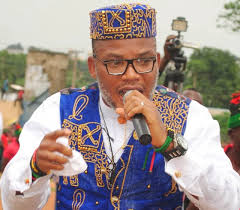By Maureen Aguta, Abuja
A court-ordered medical panel has certified the detained leader of the Indigenous People of Biafra (IPoB), Mazi Nnamdi Kanu, medically fit to continue standing trial on terrorism charges.
The panel, constituted by the President of the Nigerian Medical Association (NMA) on the directive of the Federal High Court, Abuja, submitted its report to the court on October 13. Portions of the report were read in open court on Thursday after the prosecution, led by Chief Adegboyega Awomolo (SAN), referred to its findings.
According to the panel, “the defendant’s ailment is not life-threatening,” confirming that Kanu can proceed with his trial.
Court-ordered medical review
The medical evaluation followed an application by Kanu’s counsel, Chief Onyechi Ikpeazu (SAN), who had on September 26 urged the court to allow his client’s transfer to the National Hospital, Abuja, for medical treatment. The application relied on a report by a Professor of Medicine, dated September 24, which was addressed to the Department of State Services (DSS), where Kanu has been held since June 2021.
Justice James Omotosho, presiding over the case, subsequently ordered the NMA President to assemble a panel of between eight and ten medical experts to examine Kanu’s health. The panel was tasked to determine his fitness to stand trial, the adequacy of DSS medical facilities, and whether there was a need to transfer him to the National Hospital for urgent treatment.
The report, initially due on October 8, was delayed after the panel requested additional time to conclude its findings. It was finally submitted on October 13, confirming that the IPOB leader’s condition was stable and that he could continue to participate in the ongoing legal proceedings.
Court accepts findings, sets defence date
Delivering his ruling, Justice Omotosho said the court was satisfied with the report’s findings and that there were no objections from either the prosecution or defence.
He therefore directed that Kanu’s defence open and close its case within six consecutive days beginning from October 23.
In a separate ruling, the judge also granted an oral application by the defence counsel, Chief Kanu Agabi (SAN), requesting that Kanu’s legal team be allowed private consultations with him outside the DSS premises. Agabi had raised concerns that interactions between Kanu and his lawyers within the DSS facility might be recorded or monitored, undermining attorney-client confidentiality.
Justice Omotosho approved that the private consultation be held within the courtroom on October 22, from 9 a.m. to noon, with only Kanu and his lawyers present. The trial will resume the following day, October 23.
Long-running trial
Kanu, who was first arraigned in 2015, faces multiple charges bordering on terrorism and secessionist activities. He is accused of using his platform as IPOB leader to broadcast threats and incite violence across Nigeria in pursuit of a sovereign Biafra Republic, comprising the country’s South-East and parts of the South-South and North-Central regions.
He has consistently denied the allegations, describing them as politically motivated and an attack on his right to self-determination.
The IPOB leader’s prolonged detention has drawn criticism from human rights advocates, lawmakers, and international observers, many of whom have accused the government of violating court orders regarding his release. The DSS, however, insists that Kanu’s continued detention is necessary for national security.
Tensions ahead of planned protest
Thursday’s development comes amid renewed public interest in Kanu’s case, as activists and supporters prepare for a planned protest in Abuja on Monday, October 20, calling for his unconditional release.
The protest is being organised by a coalition of civil rights groups led by Sahara Reporters publisher and rights activist, Omoyele Sowore, who described Kanu’s incarceration as an “illegal detention” and an affront to due process.
Security agencies are expected to increase surveillance across parts of the capital in anticipation of the demonstration, which organisers say will be peaceful.
Political and legal implications
The latest ruling by Justice Omotosho marks a significant turning point in a trial that has stretched over a decade and become a touchstone in debates over civil rights, national unity, and judicial independence in Nigeria.
Analysts say the court’s insistence on a medical review and the transparency of its handling of the report could help dispel claims of bias, even as the case continues to divide public opinion along regional and political lines.
While the federal government maintains that it is prosecuting Kanu purely on national security grounds, his supporters view him as a political prisoner and symbol of marginalisation in the South-East.
As the trial resumes on October 23, attention will turn to how the defence mounts its case and whether the proceedings can move forward without further delays — or new controversies.
For now, the court’s decision confirming Kanu’s medical fitness clears one major hurdle in a case that continues to test the strength and fairness of Nigeria’s judicial system.


